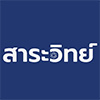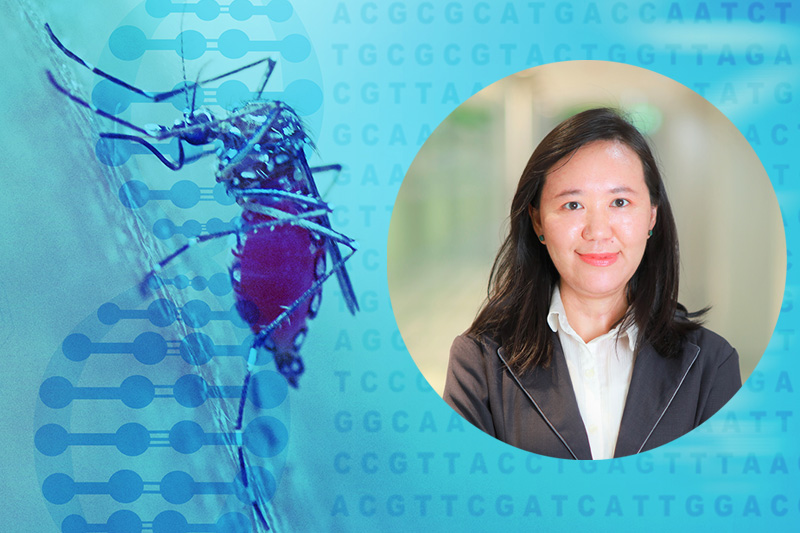โครงการการนำส่งแอนติบอดีต่อโปรตีน E ของไวรัสเดงกี่เข้าสู่เซลล์โดยการประยุกต์ใช้นาโนพาร์ทิเคิลชนิดโพลิเมอร์โซม ( Intracellular delivery of antibodies against dengue envelope protein (E) through polymersome nanoparticles) นำโดย ดร.ร่มฉัตร ไกรว่อง นักวิจัยทีมวิจัยชีววิทยาโมเลกุลของไวรัสเด็งกี่และฟลาวิไวรัส กลุ่มวิจัยเทคโนโลยีชีวภาพระดับโมเลกุลทางการแพทย์ ร่วมกับภาควิชาเทคโนโลยีชีวภาพ คณะวิทยาศาสตร์ มหาวิทยาลัยมหิดล ภาควิชาเทคนิคการแพทย์ คณะวิทยาศาสตร์และเทคโนโลยี มหาวิทยาลัยราชภัฏสมเด็จเจ้าพระยา Institute for the Physics of Living System, University of College of London สหราชอาณาจักร และ Sichuan University สาธารณรัฐประชาชนจีน ได้รับการคัดเลือกสนับสนุนทุนวิจัยจำนวน 150,000 ดอลลาร์สหรัฐ (ประมาณ 5.2 ล้านบาท) จาก Alliance of International Science Organization (ANSO) สาธารณรัฐประชาชนจีน เป็นระยะเวลา 3 ปี (พ.ศ. 2565-2567)
โรคไข้เลือดออกเป็นปัญหาที่สำคัญทางสาธารณสุขของประเทศในเขตร้อนชื้น จากข้อมูลของ WHO พบว่าปัจจุบันจำนวนผู้ติดเชื้อมีประมาณ 400 ล้านคนทั่วโลกต่อปี ปัจจุบันยังไม่มียังไม่มีวิธีจำเพาะในการรักษาโรคไข้เลือดออกและวัคซีนป้องกันโรคไข้เลือดออกที่มีการพัฒนาก้าวหน้าที่สุดยังไม่สามารถป้องกันโรคได้อย่างสมบูรณ์เนื่องจากความซับซ้อนของระบบภูมิคุ้มกันของร่างกายและความหลากหลายของเชื้อไวรัส
โครงการวิจัยนี้เน้นการศึกษาการนำส่งแอนติบอดีเพื่อลดการติดเชื้อไวรัสเดงกี่และลดความรุนแรงของโรค โดยการนำเทคโนโลยีนาโนพาร์ทิเคิลชนิดโพลิเมอร์โซมมาใช้เพื่อช่วยนำส่งแอนติบอดีเข้าสู่เซลล์ที่ติดเชื้อไวรัสโดยตรงซึ่งจะมีความจำเพาะต่อโปรตีนของไวรัสที่อยู่ภายในเซลล์และคาดว่าจะช่วยยับยั้งการสร้างไวรัสก่อนที่จะส่งออกมาภายนอกเซลล์ ซึ่งวิธีนี้คาดว่าจะสามารถลดการติดเชื้อโดยไม่เกิดการกระตุ้นภูมิคุ้มกันที่รุนแรง
สนับสนุนโดย The Alliance of International Science Organization (Project No. ANSO-CR-PP -2021-08)
A project entitled “Intracellular delivery of antibodies against dengue envelope protein (E) through polymersome nanoparticles”, led by Dr. Romchat Kraivong, was awarded USD 150,000 by the Alliance of International Science Organizations (ANSO), China, for a period of 3 years (2022-2024).
Dengue cause severely national and global public health, wellbeing and economic problems particularly in sub-tropical and tropical regions. According to the World Health Organization (WHO), nearly 400 million people get dengue fever annually. Studies of dengue vaccine available showed that the vaccine was efficient but only in certain age groups. Moreover, there is currently no antiviral treatment specifically for Dengue fever.
Dr. Romchart Kraivong, a researcher from Molecular Biology of Dengue and Flaviviruses Research Team, Medical Molecular Biotechnology Research Group (IMBG), National Center for Genetic Engineering and Biotechnology (BIOTEC) in collaboration with 1). Biotechnology Department, Faculty of Science, Mahidol Universiy, Thailand, 2). Department of Medical Technology, Faculty of Science and Technology, Bansomdejchaopraya Rajabhat University 3). Institute for the Physics of Living Systems, University College London, the UK, and 4). Sichuan University, China, and join forces in an attempt to address these challenges. The funded project aims to intracellularly deliver antibodies against dengue E protein into living cells infected with the dengue virus by encapsulating these antibodies into polymersomes. This approach allows direct-acting agents to target the viral protein to prevent viral replication. The key findings of the project will be the first step for development of antibody therapy for DENV treatment.
Supported by the Alliance of International Science Organization (Project No. ANSO-CR-PP-2021-08).









